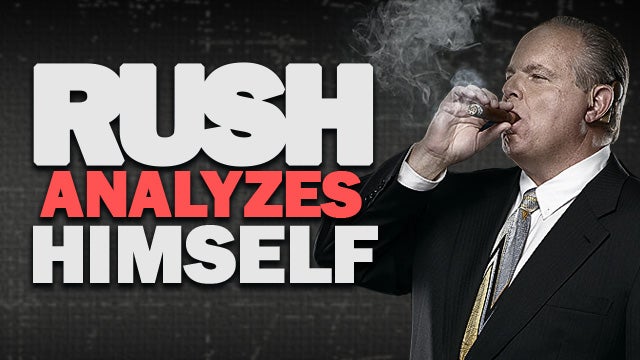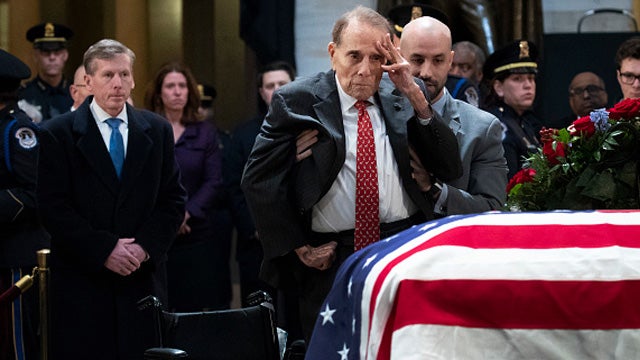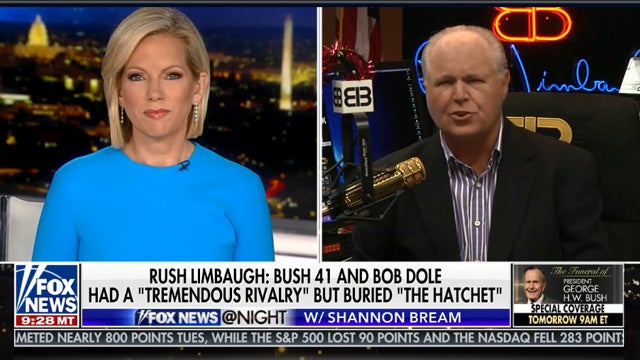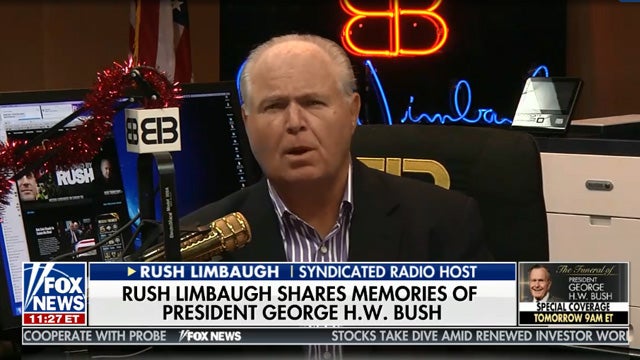RUSH: I tell you, I’m gonna save for another time going back and discussing the origin of family values and the really beginning of the roots of our cultural decay here. Just let it stand for today. If somebody wants to call and ask about it, we can go back to it here, but my only point here is that what we’re watching and what we’ve watched yesterday, the day before and today in terms of the Bush family, we are watching what America used to be. Not just the Bush family. Their values were not unique and special. They were common!

They were the virtues that were common to America. It’s not the way our politics used to be, folks. This is the way our country used to be. Now, I want to take… In fact, building on that point a little bit, I want to go to the Shannon Bream interview. I was remiss in not telling you about it. I agreed to do it Tuesday morning. Essentially how this came about, Snerdley says, “Hey, Shannon Bream wants to do a phoner with you after the show for like six minutes.” “Okay, a phoner? If that’s all it is, doesn’t have to take 10 hours to set the place up, fine.”
So I agree to do a six-minute phoner. (interruption) Well, that’s what you said when… (interruption) You were not lying to me? (interruption) You were not lying to me to set me up? I didn’t think so. So they said a six-minute phoner. So I agreed to the six-minute phoner, and within minutes I get an email from Shannon Bream herself saying, “Rush, my audience will shoot me if I don’t show them your face. We’ve got to use a camera. Maybe we can use your Dittocam.” So I said, “Okay, what’s this? Here we are, setup specialty No. 5, and I fall for it yet again!”
So I start wondering who’s behind it. Then I got hold of Scott and I said, “Okay, let’s see if we can rig the Dittocam to have enough bandwidth to feed them up there without having to set up a whole studio here with lights and cameras like they usually do.” We made that work. So I did the interview with Shannon Bream. It was on tape but was made to appear live. It was live to tape, meaning it wasn’t edited. But we did it right after the program, and it was the way television should be done!
From start to finish, it was over in 10, 15 minutes (laughing), not 10-to-15 hours, or two-to-three hours. So here are the highlights of it. Because it was not certain how this was gonna happen, I didn’t promote it during the program. So Fox was promoting it, but I’m sorry, I forgot to mention it to you. It was Tuesday night, and what Cookie’s done here is just put together the best of comments. It’s about 2-1/2 minutes it runs here, because Shannon was good. She asked a question; let me answer it. Asked other question; let me answer it.
There’s a gem in here that just happened to come out of me. It just happened to flow out of me here when I was in the answer that I’ll point it to you when we finish.
BEGIN ARCHIVE CLIP
RUSH: Well, Shannon, it was a different time. It was a different time. In ’92 it was a different time than ’42, but ’92 is closer to ’42 than ’92 is to today in terms of the definitions of public morality and values. And you nailed it. The one thing… I mean, I was raised this way. You do not brag. You do not brag about yourself. Even if you can do it, you don’t do it. It’s not becoming. It’s unseemly to do so. And the Bushes, if anything, were that.
And you’re right. They had a belief that the office was bigger than the man. George W. Bush, I routinely asked him, “Why are you not fighting back against some of these just insidious personal insults?” He said, “Because I’m not going to sully the office and take it down to the gutter of where politics is today.” And I said, “But you’re letting down a lot of people that voted for you.” But that’s just the way they were raised — and not bragging and not talking about things that you had done.
I think in those days, Shannon, it was thought that those great achievements and accomplishments would speak for you, that they would be part of how you were publicly known. But against the media onslaught to disparage that, to criticize it, to ignore it, the public had no chance. The public that was young enough not to remember World War II had no recollection of that George Bush whatsoever, and so they were never going to learn it because he wasn’t going to tout it. …
And Bob Dole today… This was just… It had me spellbound. The man cannot stand. He literally cannot walk. He is glued to his wheelchair. And he willed himself to stand up. He had an aide helping him, propping him up under his arms — and you could see the determination on his face. He was going to stand. He was going to defy the impossibility that he cannot do it. He defied impossibility and stood up for the barest of seconds and saluted with his left hand and then collapsed back to his wheelchair. And in that moment, said more about that generation — about respect, about honor, about integrity. That little piece.
I hope everybody has a chance to see that, because Bob Dole was totally incapable of doing what he did today, and yet he did it.
END ARCHIVE CLIP
RUSH: Now, the part about that that most people don’t know is that Bob Dole and George H. W. Bush had one heck of a very, very deep rivalry. It was mostly political. Some of it was personal. It was. Dole always felt slighted. He was a war hero. In fact, he lost the use of his arm. He was a ground-troop war hero, and he never got any for it, never got any accolades. Nobody ever raised hell about it like they did with George Bush getting shot down. They battled over who was gonna run the RNC.
They ran over who led the Republican Party. They battled over a number of things. Bob Dole showing up at the rotunda, Statuary Hall, to do what he did, not being able to do it… You’ve heard about the World War II generation be called the Greatest Generation. That act was typical of who they were. Bob Dole… There was no way Bob Dole was gonna fall back on, “Everybody knows I can’t stand up.” He was not gonna fall back on, “Everybody knows I can’t salute. Everybody knows that I can’t; they’ll know I would if I could. That doesn’t get it done.”
Thinking you could do it — understanding that if you could do it you would — doesn’t get it done. You have to do it! If you can’t stand on your own out of a wheelchair, you have somebody stand you up — and if you can only stand for a split second before collapsing, then you do it! Because that’s what the situation calls for. That’s what duty and honor mean. You do it. You don’t rely on everybody thinking you could and thinking you would if only you could. You do it, and you could see on Dole’s face…
 I saw many things on his face. I saw the deep sense of honor and respect. I saw the defiance. He defied the impossible. He overcame it and did it, even for less than a second. He was unable to do it on his own. He demanded that his aide lift him out of there. His aide didn’t want to do it. You could tell the aide felt uncomfortable. The aide… He couldn’t stand on his own. He let go for a split second. Dole got the salute up and immediately collapsed back into the chair with the help of the aide.
I saw many things on his face. I saw the deep sense of honor and respect. I saw the defiance. He defied the impossible. He overcame it and did it, even for less than a second. He was unable to do it on his own. He demanded that his aide lift him out of there. His aide didn’t want to do it. You could tell the aide felt uncomfortable. The aide… He couldn’t stand on his own. He let go for a split second. Dole got the salute up and immediately collapsed back into the chair with the help of the aide.
When he got back down to the chair, he was out of breath. But you could tell that he had written all over face “mission accomplished.” In that, we saw real honor, real commitment, profound respect for a long-held rival. They never became the best of friends. They were united by virtue of party and purpose that being members of the same party represented. But there was always a reason. Bob Dole from Kansas, middle class, never had a lot of money.
George H.W. Bush, patrician, Northeastern, every advantage in the book, even though he threw it all the way and went to Odessa, Texas, to start from scratch in the oil business. Bob Dole always felt like he was the same quality guy, as good a man as George Bush was, just never got the same kind of respect. But in George Bush’s death, Bob Dole triumphed. Now, her question to me that got this answer started. She said, “[W]e’ve heard so much about the Bush family being very modest in saying, ‘It’s not all about you.
“‘Don’t go out there and be bragging about yourself,’ to the point that Andrew Ferguson — who obviously was a speechwriter for Bush 41 during the ’92 campaign — lamented the fact that this guy was a World War II hero, but now that he was facing off against this young, upstart Southern governor, they” wouldn’t talk about it. Bush wouldn’t talk about it, wouldn’t allow it to be discussed. Therefore, Bush wouldn’t let his people draw the contrast — World War II hero — to this philandering guy out here. You know, this southern Huckster from Arkansas.
His speechwriters and others got very frustrated that Bush would not let them draw the contrast. Because in Bush World, the contrast should have spoken for itself. In Bush’s world, your achievements spoke for you — and if you had to tell people about ’em, they may as well not have happened. That was just the value. By the way, I was raised with the same stuff. Another one was: You never, ever talk about money. Never. It isn’t done. That’s out the window now. Everybody and their uncle talks about money, and especially their own — as in how much.
 But the Bush family and that generation, if you had to sing your own praises, then you may not have had any at all. They should speak for you. Meaning others should take note, but you can’t be the one to talk about it. So he didn’t allow it to happen. In that sense, you know, Bush, World War II, 1940 to ’45, I made the point that in 1992 when Bush was running for reelection, 1992 America was much closer to 1940s America in terms of values, culture, and morality, than 1992 is to present day America.
But the Bush family and that generation, if you had to sing your own praises, then you may not have had any at all. They should speak for you. Meaning others should take note, but you can’t be the one to talk about it. So he didn’t allow it to happen. In that sense, you know, Bush, World War II, 1940 to ’45, I made the point that in 1992 when Bush was running for reelection, 1992 America was much closer to 1940s America in terms of values, culture, and morality, than 1992 is to present day America.
Present day America has so little in common with 1992 America that it’s stark. So little of 1992 America survives in terms of culture, virtue, decency. But in the 50 years between the 1940s and 1992, it wasn’t that big a drop-off, and that’s what George Bush found himself up against, and clearly, was at a crossroads as to how to deal with it and how to portray it. One more from Shannon Bream. This was, again, on the Tuesday night interview, and I think that’s pretty much… Did this wrap it up? It may have. Yeah. This is the next bite…
BEGIN ARCHIVE CLIP
BREAM: Well, may President George H.W. Bush bring out the best in all of us across the spectrum as we honor him this week. Rush, thank you so much for sharing your insights and your memories. We really appreciate it.
RUSH: You know, if I was Barack Obama, I’d be really upset, Shannon. All this talk about George Bush being the last days of civility? If I were Obama, I’d say, “What about me? You know, I was civil. I was a nice guy, sophisticated. I was the smartest guy in the room. Why are they going back and honoring this guy?” If I were Obama, I’d be worried.
BREAM: Hmmm.
 RUSH: Maybe the media is forgetting him.
RUSH: Maybe the media is forgetting him.
BREAM: Not so fast, I don’t think, Rush.
RUSH: (laughing)
BREAM: Thank you!
RUSH: (laughing)
BREAM: Great to see you.
RUSH: I had to get that in.
BREAM: (laughing)
END ARCHIVE CLIP
And we gotta get this in.


